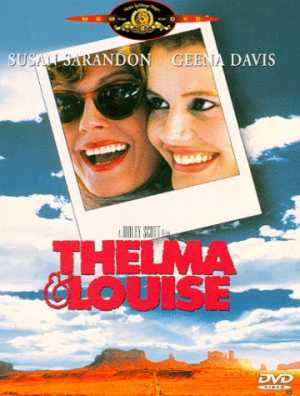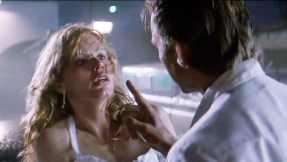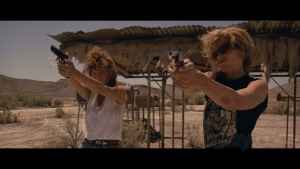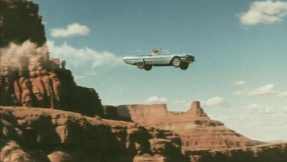Thelma and Louise: The Language of Patriarchy
Warning: This post contains spoilers about the film Thelma and Louise. Read at your own risk.

The film Thelma and Louise revolves around the unexpected crime spree of two best friends: small-town waitress Louise and housewife Thelma. What started out as an innocent weekend trip to a cabin becomes the story of two women on the run from the police, after Louise shoots and kills Thelma’s would-be rapist. The film features two women who come into their own strength and independence after receiving abuse from the film’s central male characters. The pervasive language of patriarchy and misogyny fill the film from start to finish, illustrating how society has created these two female criminals. Voice and language act throughout the film as the “gun:” the ultimate symbol of power and agency.
Thelma and Louise opens with the title characters planning their weekend fishing trip. At this point in the film, both female characters are still complacent members of a patriarchal society and their speech hints at this tendency. When asked about the upcoming trip, Thelma responds, “I still have to ask Darryl if I can go” (Thelma and Louise, 1). Thelma has adopted the language of patriarchy, accepting the idea that her husband, Darryl, has control over her actions and that, therefore, she is required to ask his permission before planning a weekend. Even Louise, who is admittedly less accepting of the patriarchy in the beginning, adopts some of its language, asking: “What’d he say” (3) as she and Thelma continue to plan their trip. Despite the fact that Louise had previously knocked the idea that Darryl should have any control over Thelma’s decisions by asking: “is he your husband or your father” (2) earlier in the conversation, Louise has still exhibited a measure of acceptance that society attributes dominance to the man in the relationship by asking whether Thelma had received Darryl’s permission. Thus, Thelma and Louise start the film existing in reluctant acceptance of a patriarchal society. Thelma does leave on the trip without asking her husband, but his reaction is a constant worry until her and Louise become preoccupied with larger issues.

The pivotal moment of the film occurs when Thelma and Louise stop for a drink and food at a tavern called the Silver Bullet. Once there, they meet Harlan, who will change the course of their lives with his actions and his words. Harlan sets himself up as a dominant figure and reflects the patriarchal views of society from the first moment he speaks to the two female leads. His first words are: “Now what are a couple of kewpie dolls like you doin’ in a place like this?” (7). Harlan has referred to two grown women as “kewpie dolls,” which are small dolls that often resemble babies. He has failed to acknowledge the women as human beings, rather referring to them as “dolls” and even more diminishing as baby-dolls. Though Thelma fails to see the problem with this language, Louise, a more savvy character, is not as comfortable with Harlan’s presence. Of course, Harlan’s character does not stop with just this type of language, but goes even further.

Harlan soon takes a drunken Thelma into the dark and isolated parking lot. Once there, Harlan attempts to have sex with her and as Thelma refuses, he becomes increasingly more violent. His language during this scene demonstrates the measure of power he feels that he has. As Harlan grabs and manhandles Thelma, he tells her numerous times that he “won’t hurt [her]” (11). Harlan’s claims that he won’t hurt Thelma, coupled with his sexually aggressive actions and her resistant actions combine to indicate how Harlan expects that Thelma will submit to his demands. Even as she fights back, he assures her that he “won’t hurt” her and clearly expects that this verbal assurance will be enough to force her compliance. It is Thelma’s failure to give into his verbal pressuring that causes Harlan to become more physically violent in his attempted rape.
Fortunately for Thelma, Louise shows up with the gun that Thelma had brought along on their road trip and demands that Harlan release Thelma. Yet even with the threat of the gun, Harlan continues to have faith in the power of his voice. He tells Louise that “we were just havin’ a little fun” (12) and clearly expects to be able to talk himself out of any danger. Harlan cannot conceive of anyone not believing his word. He is so entrenched in a patriarchal and misogynistic society that he may believe it himself. When Louise fails to believe his word and even scolds him before beginning to walk away, Harlan acts out with his voice by exclaiming: “Bitch. I should have gone ahead and fucked her” (13). Harlan does not fear reprisal, despite the fact that Louise still has a gun in her hand. He feels justified in calling the women bitches, a derogatory term that compares women to female dogs, again dehumanizing them. He even feels that he has the power to have just “gone ahead and fucked” Thelma, clearly indicating his complete assurance in masculine authority and power.
It is at this point of the film, that Louise begins to actively and verbally question the language of patriarchy and misogyny. She demands, “What did you say” (13), from Harlan. He responds with “I said suck my cock” (13) and it is this blatant misogyny that causes Louise to shoot and kill him. In the midst of Thelma’s shocked reaction, Louise stares down at the bloody body of Harlan and admonishes him to “watch your mouth, buddy” (13). The act of physical and sexual violence against Thelma was horrible enough, but the pervasive belief of male superiority evident in Harlan’s speech is what pushes Louise over the edge. The same type of language will be echoed throughout Thelma and Louise by other male characters, who don’t ever take physical action against the female leads, but whose patriarchal views help oppress them until they become fully committed to their lives on the run.
Immediately following Harlan’s death, Thelma suggests to Louise that they go to the police and tell them everything. Louise, who is already well aware of the patriarchal society the women live in, tells her no because “who’s gonna believe that?! We just don’t live in that kind of world” (14). Thelma has not yet become fully aware of how much more power and agency men have in the world they live in. Louise is indicating through her language that in the society they live in, no one would believe a woman’s language over a man’s. Though Harlan can no longer speak for himself, other witnesses to Thelma’s previous behavior with him would speak. Besides, her actions of dancing would speak louder to the police than her verbal protests of attempted rape. By the end of the film, Thelma has reached this conclusion as well. When Louise begins to regret not going to the police and ruining their lives by running, Thelma assures her that nothing would have been different even if they had gone to the police. She tells Louise that “probably nothin’ woulda happened to him. ‘Cause everybody did see me dancin’ with him all night. And they woulda made out like I asked for it” (67). Thelma has come to realize that the language of a female would not be considered as powerful as male language. Harlan would have most likely claimed that they were just having fun. Even more, Thelma has come to realize that female language is not as powerful as action seen through the eyes of patriarchy. In the society that they live in, Thelma’s voluntary dancing with Harlan would almost certainly have been construed as a willingness to engage in sexual activity with him.
Thelma and Louise also features other male characters besides Harlan exhibiting patriarchal and misogynistic language. When the cops and the FBI realize who they are looking for, they decide to tap Thelma’s husband, Darryl’s, phone in case she calls. The FBI instructs Darryl on how to act if and when Thelma calls by stating, “Well, if she calls, just be gentle. Like you’re happy to hear from her. You know, like you really miss her. Women love that shit” (47). This language not only lumps all women together as if they were one single entity without individuality, but also reads as condescending and dismissive of women. The agent dismisses emotion and kindness as “shit” that should be used to get what a man wants from a woman. His language echoes the sentiment that men have more power and agency even in their speech. He does not attempt to physical intimidate the female leads, but rather to manipulate them through speech. The fact that this ploy fails does not detract from the expectation that it would work.

Near the end of the film, a male character again demonstrates the prevailing societal norm that men have more power and agency and that they can exhibit this power through speech. Throughout Thelma and Louise, the title characters have run into a truck driver numerous times. Each time they see him, he makes increasingly obscene gestures and suggestions to the women. The final time that they encounter him, the two women lead him off of the road and demand an apology for his behavior and words. The women attempt to exhibit dominance through language, but the man is so secure in his position of power that he refuses: “I’m not apologizing for shit” (73). Even after Thelma and Louise pull out a gun and threaten him, the trucker driver responds with demeaning and aggressive language. He exclaims, “Fuck you” and “You bitch” (73). Once again, the women have been dehumanized by being referred to as a “bitch.” Not only do the men in the film feel justified in demanding sexual obedience, but they also feel justified, however unconsciously, in placing men over women through their language. When the two women shoot up his truck and cause it to explode, he in turn verbally explodes with “You fucking bitch! Aaaaaaarrrgghh!!! You’re gonna have to pay for that!!! I’m gonna make you pay for that!!” (73). Despite the fact that both women have guns and have just shot up his car, he verbally assaults the two. His protestations of making the women pay indicate that he feels that he has power over the women. And verbally he does: he fears no reprisal from the police or society, while the women do. He continues to vehemently and aggressively scream even after Thelma tells him to “shut up” (73). This time it is Thelma and not Louise telling a man to watch his mouth. However, it is in vain, because even as the two women drive away the truck driver is still screaming. He does not feel any pressure to be silenced and never gives into the women’s verbal attempt at dominance.
Thelma and Louise culminates with the two women being chased to the edge of the Grand Canyon by the police and the FBI. By this point in the film, both title characters have accepted that society will never accept their verbal rebellions against male dominance. They have tried to escape from the patriarchal and misogynistic society that created the circumstances they find themselves in: a domineering husband, a sexually-expectant rapist, and more. They have failed. The women feel that there is no option within society for them to find agency and power in a masculine world. In the end, they choose instead to “keep going” (80) in their escape and drive off of the canyon.

Throughout Thelma and Louise from the opening description of Thelma’s relationship with her husband to the attempted rape to the final confrontation with the truck driver, the women are confronted with language that depicts the overwhelming power and agency that men enjoy in society. At numerous points, both Louise and Thelma attempt to verbally question and reject this dominance. The women are ultimately unable to successfully find power and agency through their voice. Though the women cannot assert dominance by making the men in society “watch their mouths,” they do irrevocably turn away from the current patriarchal society that they live in through their actions. They take the ultimate step of removing themselves from male power by committing suicide.
Works Cited
Thelma and Louise. Dir. Ridley Scott. Screenplay by Callie Khouri. Perf. Geena Davis and Susan Sarandon. Sony Pictures Entertainment, 1991. Transcript.
What do you think? Leave a comment.











This is a great female empowerment movie, that still holds up today. I really liked when you mentioned the lowlife rapist only sees women as nothing but a doll. A very well constructed analysis.
Thelma and Louise certainly engages with issues of feminism and women’s place in society effectively and without overdoing it.
Really interesting article. I’ve always felt that Thelma and Louise is a powerful female empowerment movie, perhaps I’d go further to call it a feminist movie, and your analysis really supports this concept. The detail and attention that you’ve devoted to this article makes it convincing and enlightening. I wonder, though, what you make of J.D and Jimmy and how they fit into the patriarchal world you’ve identified so well?
I hadn’t thought of how much of this movie’s plot was dependent upon language. Very interesting. Thanks for posting!
Love this movie! I loved how Thelma’s character grows and develops throughout the film. I enjoyed your article; you had a lot of interesting and insightful points to say. Well done!
Thanks!
It’s a great film because of all the reasons you mention. Strong female leads in current film are too few…
I loved the ending.
This is a powerful movie showing the bonds of friendship and the complicating circumstances of self defense.
The film tests us to ask ourselves if we’re satisfied with life and how in order to survive in this world you must be happy and have friendship.
Zarah, I like your words,” The film tests us to ask ourselves if we’re satisfied with life and how in order to survive in this world you must be happy…” Being happy is rewarding yet, challenging at times. However, to be in possession of a true friendship is a bonus in this life. With Grace
~Venus
If one wishes to see Thelma and Louise as a feminist flick, however, it does not give a very good picture of the qualities of women.
What?
I loved the analysis here, especially the breaking down of the verbage used. While this film has its flaws, it spoke a lot about what camaraderie and resiliency can do for female empowerment.
This is excellent analysis! I especially liked the discussion of language in the film.
Really a classic chick flick!
This is a sick-minded bigoted anti-male tome by a small-minded hateful writer. That’s my opinion.
I happen to adore this movie. The scenery alone made me want to explore the American South West, and the transformation of Gina Davis from docile housewife to adventure seeker is simply something to behold; I’ve never seen her so radiant.
The film struck a strong chord with (mainly) female audiences but I like it and I am male.
yes you are true, it is anti male bigotry. Men in this movie are caricatures of what toxic feminism wants us to believe that all men are or can be like that and women are all time just defending themselves from men aggression and oppression…what a total BS. in fact, if you look at the movie with an open mind, you’ll see that women in this movie are actually nasty, psychotic and neurotic, which is almost every woman.
It’s actually a marvellous piece of entertainment and unsurprisingly has maintained its popularity consistently over the years since its initial release.
I generally like the on-the-road genre of movies and this film did not disappoint me.
Nice article 🙂
This is a well directed movie!
They certainly hit the jackpot with this “Slick-Chick-Buddy-Flick”, although it did become a tad predictable as the story progressed.
It is a good, moving film!
This is a pretty good self-defence movie! Great post!
Super interesting and well said!
This film makes me want to move to Iceland! Iceland has been voted number one… I have a list of female friendly countries.
A good discussion on an interesting movie.